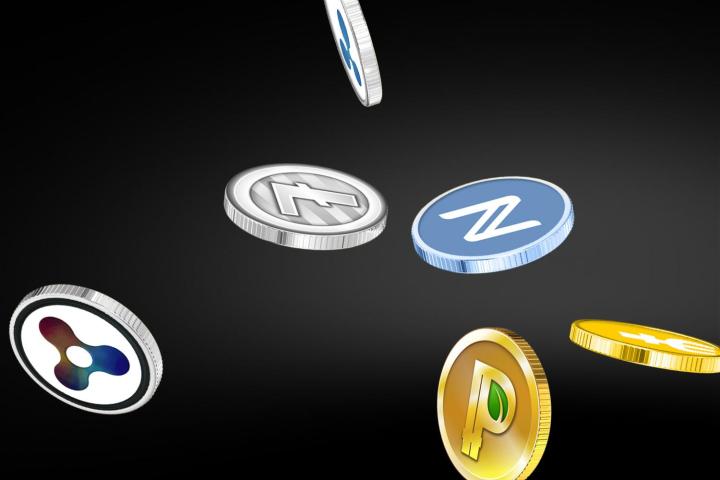
Dang. We missed out – at least, that’s how it feels when it comes to Bitcoin. A few years ago, a Bitcoin (BTC) could be had for less than one dollar, and “mining” Bitcoin – a computation-heavy process that anyone can do as a way to earn Bitcoins – was “easy” and relatively inexpensive to get into. Today, the digital currency that has skyrocketed in value over the past year to around $900 per Bitcoin (making many early adopters exceptionally rich) and the world of mining is virtually impenetrable due to the high cost of specialized computer chips made specifically for cranking through Bitcoin’s necessary processes.
Of course, anyone can still get into Bitcoin, no matter how little money you have to invest, because the digital currency can be divided into tiny fractions of a Bitcoin (0.00000001 BTC is the smallest denomination). But who wants to own 0.038 of something? This is America, dammit. All or none. Fractions are for losers.
Luckily, Bitcoin isn’t the only cryptocurrency on the block. Thanks to its rising success, a variety of so-called “altcoins” have popped out of nowhere – and some of them are downright bargains … if you think they’re worth anything at all. So, if you feel like you missed the Bitcoin boat, here are six alternative digital currencies that are just waiting for early adopters to buy in.
Litecoin
If Bitcoin is gold, Litecoin is silver, says everyone. Trading at about $30 at the time of this writing, Litecoin has seen a boost in popularity along side its older brother, rising 600 percent since 2012, when a single Litecoin cost just $0.50. Litecoin is based on the Bitcoin protocol, but unlike Bitcoin, Litecoin is designed to make mining relatively cheap and easy. It also allows for faster transaction times than Bitcoin. Just don’t expect to spend your Litecoin – few vendors accept it.
Peercoin
Another Bitcoin fork, Peercoin has a few distinguishing features that some believe could make it superior to Bitcoin – or at least just as good. The mining process is far more efficient than Bitcoin’s, and it has added security features that make it much more difficult for mining groups to take advantage of the system. As the third largest open-source digital currency on the market, Peercoin remains far from Bitcoin’s $900 price tag, at a current exchange rate of about $3.50.
Namecoin
Namecoin is perhaps the best example of the Bitcoin protocol’s versatility. Based on Bitcoin, Namecoin is not really a currency at all – at least not in the traditional sense. Instead, Namecoin acts as an alternative Domain Name System (DNS), controlling the .bit domain outside the realm of the Internet Corporation for Assigned Names and Numbers (ICANN), which oversees all the top-level domains you’re used to. Users simply purchase .bit domains for one Namecoin apiece, and the domain itself is added to the so-called “block chain,” or public ledger that keeps track of who owns which Namecoins/domains.
Because Namecoin has value outside of the currency itself (in the form of domain name ownership), it may one day prove to be more robust and valuable than other Bitcoin forks. And at just $6 per Namecoin, it may also be one of the best deals.
Primecoin
Aptly named Primecoin strays from Bitcoin in one important way: It uses prime numbers as the basis for its encryption. In doing so, the Primecoin network is set to discover new prime numbers – something the scientific and mathematics communities have been doing for decades. Prime numbers are so important that you can win major prize money from organizations like the CIA or the Electronic Frontier Foundation for discovering extremely long prime numbers (think tens of million of digits long).
Ripple
Ripple is the first currency on this list that’s not based on the Bitcoin protocol. It’s also the most unique of the major cryptocurrencies because it’s far more than just a currency. First, you have the currency part, called Ripples – those are kind of like Bitcoins or anything else on this list. The second part is a payment network, through which you connect with trusted contacts with whom you can send and receive Ripple payments.
Finally, Ripple is its own distributed exchange, which means offers to buy and sell Ripples are included in the public block chain alongside key data, like transaction histories and digital wallet balances. This exchange system and other unique factors give Ripple the ability to act as an exchange for all types of currencies, from Ripples to Bitcoins to U.S. dollars.
Given Ripple’s wide-ranging capabilities, this may be the one cryptocurrency with the most buzz after Bitcoin and Litecoin. It also has backing from a range of major venture capitalist firms, including Andreessen Horowitz, Google Ventures, Lightspeed Ventures, and more. Current cost of a single Ripple: $0.025.
QuarkCoin
Launched earlier this year, QuarkCoin is one of the youngest altcoins available, but it has quickly risen in popularity, clocking into the top five most popular cryptocurrency on the market, according to Coin Market Cap. QuarkCoin’s primary selling point is extreme security – we’re talking nine separate rounds of encryption that use six different types of encryption algorithms. Cryptocoin experts believe QuarkCoin has the potential to become a viable digital currency for buying and selling goods – perhaps even more so than Bitcoin. For now, however, it’s just a theoretical plaything. Fortunately, it’s still cheap, at just about $0.25 per QuarkCoin – a no-brainer investment, if you think it has the ability to become worth even a tenth of Bitcoin’s current value.








